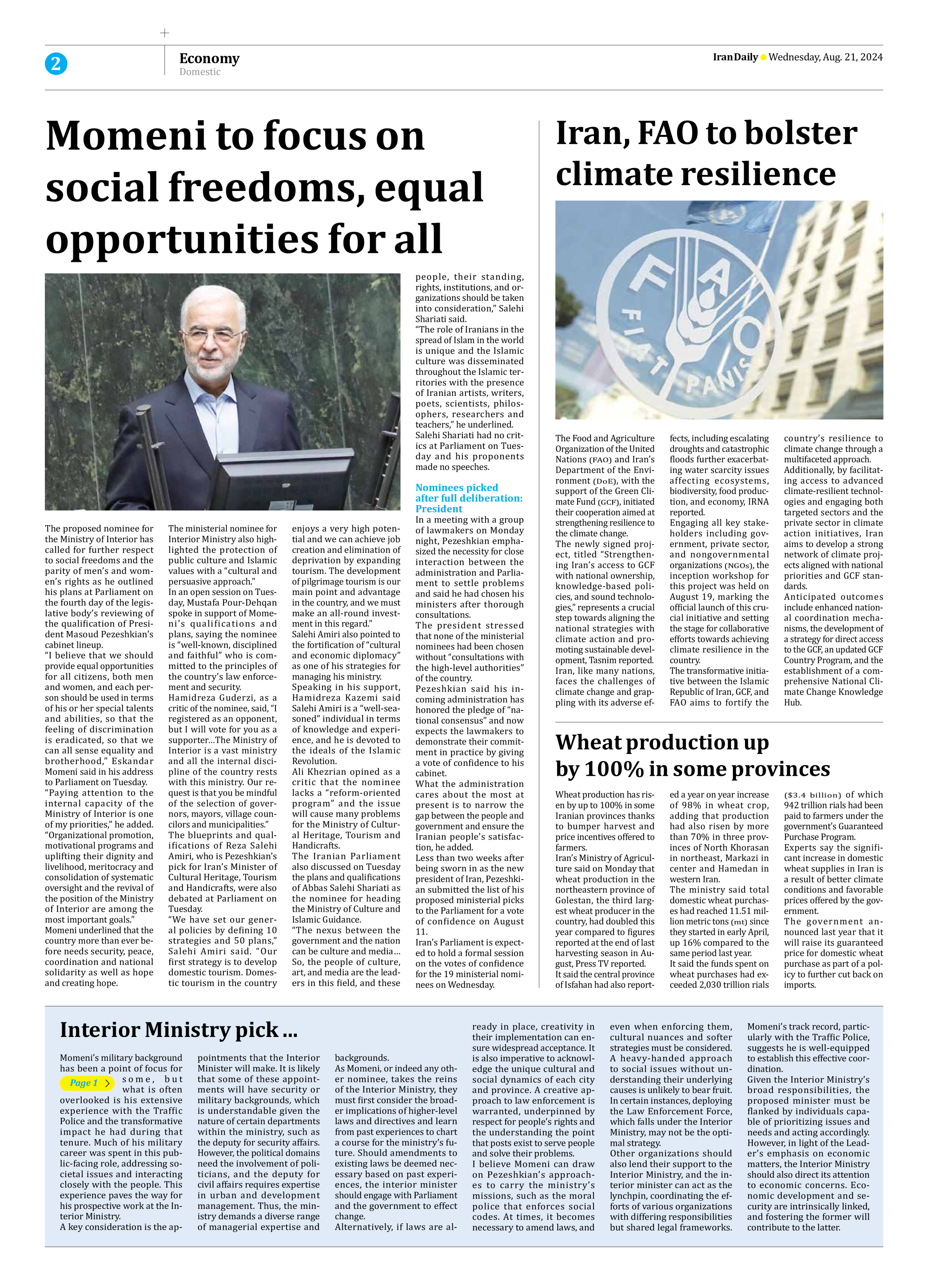
Momeni to focus on social freedoms, equal opportunities for all
The proposed nominee for the Ministry of Interior has called for further respect to social freedoms and the parity of men’s and women’s rights as he outlined his plans at Parliament on the fourth day of the legislative body’s reviewing of the qualification of President Masoud Pezeshkian’s cabinet lineup.
“I believe that we should provide equal opportunities for all citizens, both men and women, and each person should be used in terms of his or her special talents and abilities, so that the feeling of discrimination is eradicated, so that we can all sense equality and brotherhood,” Eskandar Momeni said in his address to Parliament on Tuesday.
“Paying attention to the internal capacity of the Ministry of Interior is one of my priorities,” he added. “Organizational promotion, motivational programs and uplifting their dignity and livelihood, meritocracy and consolidation of systematic oversight and the revival of the position of the Ministry of Interior are among the most important goals.”
Momeni underlined that the country more than ever before needs security, peace, coordination and national solidarity as well as hope and creating hope.
The ministerial nominee for Interior Ministry also highlighted the protection of public culture and Islamic values with a “cultural and persuasive approach.”
In an open session on Tuesday, Mustafa Pour-Dehqan spoke in support of Momeni’s qualifications and plans, saying the nominee is “well-known, disciplined and faithful” who is committed to the principles of the country’s law enforcement and security.
Hamidreza Guderzi, as a critic of the nominee, said, “I registered as an opponent, but I will vote for you as a supporter…The Ministry of Interior is a vast ministry and all the internal discipline of the country rests with this ministry. Our request is that you be mindful of the selection of governors, mayors, village councilors and municipalities.”
The blueprints and qualifications of Reza Salehi Amiri, who is Pezeshkian’s pick for Iran’s Minister of Cultural Heritage, Tourism and Handicrafts, were also debated at Parliament on Tuesday.
“We have set our general policies by defining 10 strategies and 50 plans,” Salehi Amiri said. “Our first strategy is to develop domestic tourism. Domestic tourism in the country enjoys a very high potential and we can achieve job creation and elimination of deprivation by expanding tourism. The development of pilgrimage tourism is our main point and advantage in the country, and we must make an all-round investment in this regard.”
Salehi Amiri also pointed to the fortification of “cultural and economic diplomacy” as one of his strategies for managing his ministry.
Speaking in his support, Hamidreza Kazemi said Salehi Amiri is a “well-seasoned” individual in terms of knowledge and experience, and he is devoted to the ideals of the Islamic Revolution.
Ali Khezrian opined as a critic that the nominee lacks a “reform-oriented program” and the issue will cause many problems for the Ministry of Cultural Heritage, Tourism and Handicrafts.
The Iranian Parliament also discussed on Tuesday the plans and qualifications of Abbas Salehi Shariati as the nominee for heading the Ministry of Culture and Islamic Guidance.
“The nexus between the government and the nation can be culture and media…So, the people of culture, art, and media are the leaders in this field, and these people, their standing, rights, institutions, and organizations should be taken into consideration,” Salehi Shariati said.
“The role of Iranians in the spread of Islam in the world is unique and the Islamic culture was disseminated throughout the Islamic territories with the presence of Iranian artists, writers, poets, scientists, philosophers, researchers and teachers,” he underlined.
Salehi Shariati had no critics at Parliament on Tuesday and his proponents made no speeches.
Nominees picked
after full deliberation:
President
In a meeting with a group of lawmakers on Monday night, Pezeshkian emphasized the necessity for close interaction between the administration and Parliament to settle problems and said he had chosen his ministers after thorough consultations.
The president stressed that none of the ministerial nominees had been chosen without “consultations with the high-level authorities” of the country.
Pezeshkian said his incoming administration has honored the pledge of “national consensus” and now expects the lawmakers to demonstrate their commitment in practice by giving a vote of confidence to his cabinet.
What the administration cares about the most at present is to narrow the gap between the people and government and ensure the Iranian people’s satisfaction, he added.
Less than two weeks after being sworn in as the new president of Iran, Pezeshkian submitted the list of his proposed ministerial picks to the Parliament for a vote of confidence on August
11.
Iran’s Parliament is expected to hold a formal session on the votes of confidence for the 19 ministerial nominees on Wednesday.







